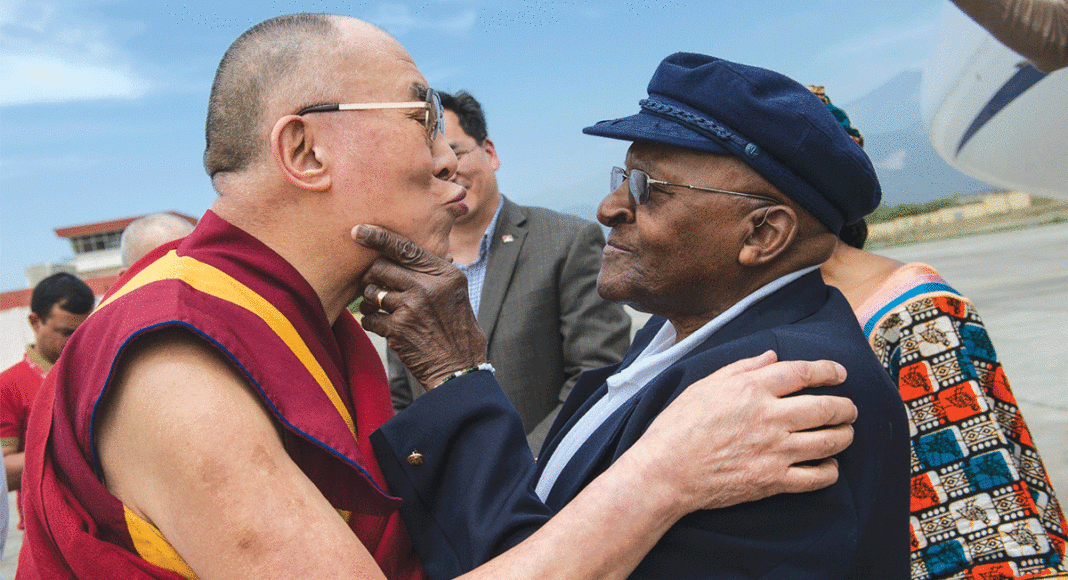Last year, Santa Cruz-based author and editor Douglas Abrams was in Dharamsala, India learning meditation techniques from the Dalai Lama and hearing from Archbishop Desmond Tutu about cultivating compassion toward one’s political enemies. Abrams moderated a five-day series of dialogues between the two spiritual icons and social leaders, documenting the discussions in The Book of Joy: Lasting Happiness in a Changing World, published last year. The book was originally conceived by Abrams and Dr. James Doty, who now heads Stanford University’s Center for Compassion and Altruism Research and Education (CCARE).
The meeting was also documented for a film which is currently in production. Abrams previously worked with Desmond Tutu on a number of books, including the children’s title God’s Dream.
On Feb. 22, Abrams will join Dr. Bruce Eisendorf for a discussion of The Book of Joy, including addressing one of the book’s underlying questions: How do we live a life of joy in the face of adversity?
The presentation—which is from 5:30-7 p.m. at Santa Cruz Support Center, in conference room B—will include a Q&A period and the screening of short videos from the Dharamsala dialogues between the Dalai Lama and Archbishop Tutu. A suggested donation of $25 (not required) will benefit programs and services of the Palo Alto Medical Foundation for people with chronic pain. I caught up with Abrams to talk about his book.
At the beginning of The Book of Joy, you write, “I am very skeptical about the magical sensations that some attribute to being in the presence of spiritual teachers, but from the very first day I found my head starting to tingle. It was startling, but perhaps it was simply an example of how my mirror neurons … were internalizing what I was witnessing in the eyes of these two extremely lovely men.”
DOUGLAS ABRAMS: The scientific skeptic in me says that the tingling could have been adrenaline. We had this incredible time. The trip was conceived of quite a few years before. The Dalai Lama was supposed to be the guest of honor at Arch’s 80th birthday, and the Chinese government leaned on South Africa, and the South African government would not give the visa, and the Dalai Lama was not allowed to come. So we really wanted to bring the Archbishop to the Dalai Lama for his 80th birthday.
To come back to your original question about the tingling; yes, looking into their eyes for five days, witnessing this incredible gaze of compassion and love and being there as this kind of representative for people was incredibly powerful. I did have this really extraordinary experience of tingling from head to toe. We have these amazing things called mirror neurons, which are the foundation for empathy. They’re what allow us to experience what others experience. That might have been my neurons firing with a kind of receiving from the Dalai Lama and the Archbishop what they experience on a regular basis.
You were in Dharamsala with the Dalai Lama and Desmond Tutu for a week, eating, drinking tea and talking. Tell me about being with these two men.
The night before the dialogues I was thinking, “Who the hell am I to be doing this, five days of interviews? And will the real Anderson Cooper or Oprah Winfrey please step in and take over?” But then I realized I was just there as a kind of ambassador for people. As Arch says, to help me overcome my self-regard. Our insecurities are part of our self-regard as well. We had this amazing opportunity not just to have this incredible five-day dialogue, but also to have the Dalai Lama teach us to meditate. And for Archbishop Tutu to give the Dalai Lama Eucharist, which is communion. That was amazing. We had meals and were able to break bread.
What stands out as one of your favorite moments during this time with the Dalai Lama and Desmond Tutu?
Many Buddhists talk about detachment and separating from worldly distractions and pleasures. I was sitting next to the Dalai Lama during lunch, and he turns to me with a bowl of Tibetan rice pudding in his hands and says, “I love this!” It was just so wonderfully humanizing. You can be the Dalai Lama, and you can still like a good bowl of rice pudding.
INFO: The “Book of Joy” discussion event with Doug Abrams and Dr. Bruce Eisendorf is from 5:30-7 p.m. at Santa Cruz Support Center 1, Conference Room B, 2200 Soquel Ave., Santa Cruz. Register online or call 458-6391. Hors d’oeuvres will be served.













